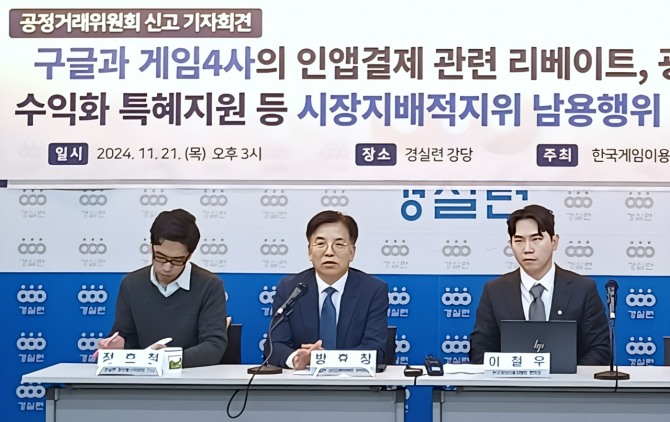Did the gaming industry collude with the app market?… ‘Google lawsuit war’ spreads due to complaint by Fair Trade Commission
View enlarged imageThe Citizens’ Coalition for Economic Justice (Citizens Coalition for Economic Justice), in collaboration with two game user groups, reported Google and the four domestic game companies to the Fair Trade Commission, claiming that they engaged in unfair competition, including collusion, and held a press conference on the 21st. From the left, Jeong Ho-cheol, head of the economic policy team of the Citizens’ Coalition for Economic Justice, Bang Hyo-chang, vice-chairman of the standing executive committee, and lawyer Cheol-woo Lee, who serves as president of the Game Users Association. Photo = Reporter Won-yong Lee
Domestic civic groups requested the Fair Trade Commission to impose fines on Google and the four domestic game companies, claiming that they engaged in collusion. Google’s app market monopoly lawsuit, which was ruled in the first trial by a U.S. court in October of this year, appears to be having repercussions in Korea as well.
On the 21st, the Citizens’ Coalition for Economic Justice (Citizens Coalition for Economic Justice), the Korea Game Consumers Association, and the Korea Game Users Association held a joint press conference at the Citizens’ Coalition for Economic Justice Hall in Hyehwa, Jongno-gu, Seoul, ‘Reporting to the Fair Trade Commission, including abuse of market dominant position related to in-app payments by Google game companies.’
At this meeting, the three organizations claimed that the three Google companies, including Google, Google Korea, and Google APAC (Asia/Pacific), had engaged in unfair anti-competition practices such as maintaining a market dominant position from around August 2019 until recently. It was added that during this process, the four game companies, including NCSoft (BC), Netmarble, Com2uS, and Pearl Abyss, engaged in collusion and received compensation.
Bang Hyo-tae, Vice Chairman of the Standing Executive Committee of the Citizens’ Coalition for Economic Justice, said, “Everyone knows that Google is a market-dominant platform company in the app market,” and added, “As a result of recently collecting and checking various data related to Google, we have found that not only Google’s misconduct, but also some domestic companies He emphasized, “It has been confirmed that they also participated in this.”
The three organizations requested that a fine be imposed based on standards on a portion of each company’s sales through a report to the Fair Trade Commission. Specifically, the amount is approximately KRW 69.7 billion, including KRW 9.7 billion from the three Google companies, KRW 27.1 billion from NCsoft, KRW 17.8 billion from Netmarble, KRW 7.9 billion from Com2uS, and KRW 7.2 billion from Pearl Abyss.
Did the gaming industry collude with the app market?… ‘Google lawsuit war’ spreads due to complaint by Fair Trade Commission
View enlarged imageCivic groups cited the results of a U.S. court ruling on the lawsuit between Google and Epic Games as the basis for suspicions of collusion between Google and Game 4. Google CEO Sundar Pichai (left) and Epic Games CEO Tim Sweeney. Photo = AP, Newsis, Reuters
On October 7, the U.S. District Court for the Northern District of California ruled in response to the anti-monopoly lawsuit filed by Epic Games against Google, “Google is subject to the anti-monopoly rules set by the U.S. federal government and the state of California from November 1, 2024 to November 1, 2027. ·The first trial sentence states, “I order you to prohibit acts that violate the Unfair Competition Prevention Act.”
The court cited the Google Play Store’s mandatory 30% in-app payment fee policy as well as ‘suspicion of collusion’ as the main grounds for Google’s ‘anti-monopoly activities’. Google’s profit sharing and provision of Google’s products and services to hardware manufacturers and game developers are linked to the obstruction of third-party app market entry.
Three organizations, including the Citizens’ Coalition for Economic Justice, also presented the U.S. court ruling as the basis for unfair practices by Google and the four game companies. In addition, it was also cited as evidence that Google had already been sanctioned by the Fair Trade Commission after being confirmed to have engaged in ‘exclusive transaction practices’ with domestic app markets such as One Store in Korea.
In April 2023, the Fair Trade Commission imposed a fine of 42.1 billion won on the three Google companies and issued corrective orders, including prohibiting unfair practices. The Fair Trade Commission claimed, “For about two years from June 2016 to April 2018, Won Store provided ‘featuring’ benefits, such as exposure to game companies as new recommended games, under the condition of not doing business with One Store.” NC’s ‘Lineage M’ and Netmarble’s ‘Lineage 2 Revolution’ were mentioned as examples of games that were managed to prevent them from entering the store.
Did the gaming industry collude with the app market?… ‘Google lawsuit war’ spreads due to complaint by Fair Trade Commission
View enlarged imageOne Store’s top 5 popularity rankings (left) and top 5 sales rankings as of November 21. There were many domestic games, including ‘Com2us Professional Baseball’. Photo = One Store mobile screen capture
In response to the claims of cooperatives and organizations such as the Citizens’ Coalition for Economic Justice, Google said, “The interpretation of the Google Play business announced today is different from the truth,” and added, “Google Play is competing faithfully with other app markets, and provides 99% of developers with less than 15% of the “We are charging the lowest service fee among the app markets, including applying a service fee, and providing various benefits to Korean developers and users,” he countered.
Game companies also denied the allegations of collusion. NC released a statement saying, “There has been no evidence of damage to other companies or users in exchange for increasing the influence of a specific platform company,” and “We express regret for causing damage to the company and shareholders with uncertain information.”
Netmarble said, “We have never participated in any illegal activities such as obtaining rebates or unfair collusion,” Com2uS said, “We have never participated in or received any compensation for unfair practices such as restrictions on the launch of other app markets,” and Pearl Abyss also said, “We have not engaged in any illegal activities such as restricting the release of other app markets.” “We have not committed any unfair actions such as restricting the release or colluding.”
The company mentioned as the subject of collusion has been selling games in One Store, which the Fair Trade Commission initially took issue with by imposing fines on Google. Pearl Abyss’ representative work ‘Black Desert Mobile’, Com2uS’ ‘Com2uS Professional Baseball’ series, or relatively recent works such as ‘Summoners War: Chronicles’, ‘Starseed: Asnia Trigger’, NC ‘Blade & Soul 2′, Netmarble’ ‘Netmarble Professional Baseball’ can all be downloaded from One Store.
However, relatively recently released box office hits such as NC’s ‘Lineage W’, Netmarble’s ‘Only I Level Up: Arise’, and ‘Growing Seven Knights’ did not enter One Store. Is this a strategic choice for global launch and marketing unity? Google There is a possibility that it may become an issue as to whether the decision was made under the influence of the policy of .
A game industry official said, “Several small and medium-sized game companies filed a lawsuit against Google as victims, but this time, large game companies have been accused of being the ‘perpetrators of collusion.'” He added, “Due to the actions of the industry and the Fair Trade Commission, this lawsuit is being filed against Google and the game industry.” “It may turn into a conflict within the gaming industry rather than a confrontation between the two,” he said.
The Korea Mobile Game Association announced on the 6th of this month that 42 domestic game and app developers will initiate group mediation against Google and Apple for monopolistic practices and excessive collection of in-app payment fees.
Won-yong Lee, Global Economics Reporter [email protected]
**Given the power imbalance between tech giants like Google and smaller game developers, what specific policy changes could effectively prevent anti-competitive practices and safeguard innovation within the Korean mobile gaming market?**
## Interview: Did Google and Leading Game Companies Collude Against Competition?
**Introduction:**
Welcome to World Today News. Today, we are examining the unfolding controversy surrounding Google and major Korean game developers, with accusations of collusion and anti-competitive practices simmering amidst a burgeoning legal battle. To shed light on this complex issue, we have invited two distinguished guests:
* **Dr. Kim Min-Jung:** Professor of Law specializing in antitrust and competition law at Seoul National University
* **Mr. Park Jae-Hyun:** CEO of a mid-sized Korean game development studio
**Section 1: The Allegations and the U.S. Precedent**
* **Interviewer:** Dr. Kim, the Citizens’ Coalition for Economic Justice, along with game user groups, has filed a complaint with the Fair Trade Commission alleging collusion between Google and several major Korean game companies. What are the specific allegations, and how strong is the evidence presented?
* **Interviewer:** Mr. Park, as a game developer, what is your perspective on these allegations? Have you personally experienced any pressure from Google or other major players regarding app store practices?
* **Interviewer:** Dr. Kim, the case mentioned in the press report refers to a similar lawsuit filed against Google by Epic Games in the United States. How might the outcome of that case impact the ongoing situation in Korea?
**Section 2: Google’s Response and the Role of Smaller Developers**
* **Interviewer:** Google denies the allegations, stating that they operate fairly and competitively. How do you respond to their claims, Dr. Kim?
* **Interviewer:** Mr. Park, the Korea Mobile Game Association recently announced a group mediation effort against both Google and Apple. What are the primary concerns of smaller developers like yourself regarding the current app market landscape?
* **Interviewer:** Do you think the Korean game industry is facing a David vs. Goliath situation, Dr. Kim? How can smaller developers ensure a level playing field in a market dominated by giants like Google and large game companies?
**Section 3: The Broader Impact and Future Implications**
* **Interviewer:** What are the potential consequences for both consumers and the Korean gaming industry if the allegations against Google and the game companies are proven true, Dr. Kim?
* **Interviewer:** Mr. Park, how do you see this situation evolving? What changes, if any, do you expect to see in the app market landscape moving forward?
* **Interviewer:** Dr. Kim, do you foresee increased regulatory scrutiny of app market practices in Korea and globally in the wake of these controversies?
**Conclusion:**
Thank you both for your insightful contributions to this important conversation. This is a developing story, and we will continue to follow it closely. The outcome of this case has the potential to reshape the Korean gaming landscape and have broader implications for the global app market.
**Note:** These are just examples, and the interviewer can delve deeper into specific examples, legal precedents, and stakeholder perspectives to create a comprehensive and engaging discussion.

